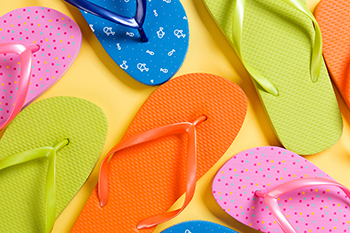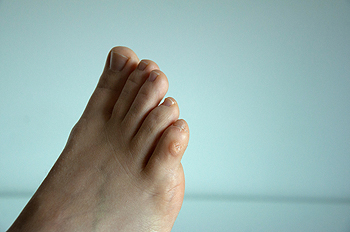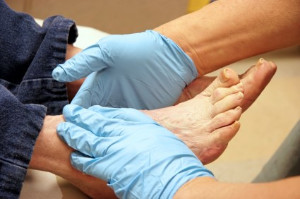

The simplicity of wearing flip flops during the summer months is appealing for many people. They are designed in different colors and styles, and have become a popular shoe. Despite their ease, they lack structural support, and this can affect the ankles, calves, heels, and feet. They are beneficial to wear in public areas where there are swimming pools and locker rooms. They are considered to be an appropriate shoe that may help to prevent athlete’s foot and toenail fungus while worn in these types of areas. Flip flops can be purchased with cushioned soles, and leather material. Additionally, it is beneficial to choose these types of shoes that have a strap in the back, which can be helpful in keeping the shoe on the foot. When the wrong type of flips flops are worn, the gait may gradually be affected, and pain may be felt in the feet. If you would like more information about the pros and cons of wearing flip flops, please schedule an appointment with a podiatrist.
Flip-flops can cause a lot of problems for your feet. If you have any concerns about your feet or ankles, contact one of our podiatrists from Grand Blanc Family Footcare. Our doctors will assist you with all of your foot and ankle needs.
Flip-Flops and Feet
Flip-flops have managed to become a summer essential for a lot of people. While the shoes may be stylish and easy to slip on and off, they can be dangerous to those who wear them too often. These shoes might protect you from fungal infections such as athlete’s foot, but they can also give you foot pain and sprained ankles if you trip while wearing them.
When Are They Okay to Wear?
Flip-flops should only be worn for very short periods of time. They can help protect your feet in places that are crawling with fungi, such as gym locker rooms. Athlete’s foot and plantar warts are two common fungi that flip-flops may help protect your feet against.
Why Are They Bad for My Feet?
These shoes do not offer any arch support, so they are not ideal for everyday use. They also do not provide shock absorption or heel cushioning which can be problematic for your feet. Additionally, you may suffer from glass cuts, puncture wounds, and stubbed toes since they offer little protection for your feet.
More Reasons Why They Are Bad for Your Feet
If you have any questions, please feel free to contact our office located in Grand Blanc, MI . We offer the newest diagnostic and treatment technologies for all your foot care needs.

There are many jobs that require standing, walking, and working on the feet for the majority of the day. This can cause foot pain to develop. The feet are the foundation of the body, and it is necessary to take proper care of them. There are effective ways to help the feet to feel good and possibly avoid foot problems. These include wearing shoes that fit correctly. Many people choose to wear a shoe that is laced, which generally makes it easier to see how well the shoe fits. When insoles are added to the shoes, they may provide additional support and cushioning to get through a long day at work. Bacteria and fungal infections may develop as the shoes are worn, and it is important to wash and dry the feet thoroughly at the end of every day. People who lead a healthy lifestyle and drink plenty of fresh water may have diminished foot pain as a result of avoiding dehydration. Wearing compression socks may help to increase circulation in the legs and feet and avoid swelling and discomfort. For more information about how to keep your feet healthy while working, please confer with a podiatrist.
While working on the feet, it is important to take the proper care of them. For more information about working on your feet, contact one of our podiatrists from Grand Blanc Family Footcare. Our doctors will treat your foot and ankle needs.
Working on Your Feet
Standing on your feet for long periods of time can cause stress and pain in your feet. Your whole body may experience change in terms of posture, back pain, bunions, callouses and or plantar warts. There are ways to avoid these conditions with proper foot care, smart choices and correct posture.
Positive Changes
Negative heeled shoe – Choosing this shoe type places the heel slightly lower than the ball of the foot. These are great for overall foot health. Find shoes that fit you correctly.
Go barefoot – Our feet were not designed to be enclosed for all hours of the day. Try to periodically expose your feet to air.
Eliminate Pain
Foot Exercises – Performing simple exercises, incorporating yoga and doing stretches are beneficial. This will allow increased blood flow to the area and muscles of the foot.
Achilles tendon – Stretching the foot out flat on the floor will relax the calf muscles and tendon. These exercises can be performed almost anywhere. Make sure you add these exercises to your daily regimen.
With a little bit of this information and knowing more about foot health, you will notice changes. Foot stretches and proper footwear will help with pain and prevent further issues.
If you have any questions please feel free to contact our office located in Grand Blanc, MI . We offer the newest diagnostic and treatment technologies for all your foot and ankle needs.

A corn on the foot can cause extreme pain despite its small size. A corn is defined as a small area of hardened skin that generally forms on top of the toes, or on the side of the pinky toe. Some people have corns that develop between the toes which are referred to as soft corns. This can occur from wearing shoes that are too tight which may cause excess pressure. Additionally, seed corns are typically found on the soles of the foot and may be seen in clusters. Many patients can find relief when thinner socks are worn and larger shoes are purchased. A protective pad may be worn over the corn which may help to reduce existing friction. If the corns are severe and are interfering with daily activities, an X-ray may be taken which can help to determine the cause. It is advised that you schedule an appointment with a podiatrist if you suffer from corns, who can guide you toward correct options.
If you have any concerns regarding your feet and ankles, contact one of our podiatrists of Grand Blanc Family Footcare. Our doctors will treat your foot and ankle needs.
Corns: What Are They? and How Do You Get Rid of Them?
Corns can be described as areas of the skin that have thickened to the point of becoming painful or irritating. They are often layers and layers of the skin that have become dry and rough, and are normally smaller than calluses.
Ways to Prevent Corns
There are many ways to get rid of painful corns such as wearing:
Treating Corns
Treatment of corns involves removing the dead skin that has built up in the specific area of the foot. Consult with Our doctors to determine the best treatment option for your case of corns.
If you have any questions please feel free to contact our office located in Grand Blanc, MI . We offer the newest diagnostic and treatment technologies for all your foot and ankle needs.

Diabetes occurs when the body does not produce sufficient insulin or use it properly, which causes blood sugar levels to rise above normal. Diabetes can affect the health of the feet as well as many other parts of the body. Uncontrolled high blood sugar levels can damage blood vessels, reduce the blood flow to feet, and have serious consequences. Diabetic neuropathy is a type of nerve damage that affects the feet and legs and that many of those with diabetes develop. Such nerve damage can cause tingling and numbness in the feet, and one might not feel pain from a foot problem - a key warning sign that something is amiss in the body. Infections can arise, and if not tended to and healed, can lead to gangrene where tissue dies from lack of blood flow. Another complication of diabetes is peripheral vascular disease, a circulation disorder that limits blood flow to the legs and feet. Healing takes longer with inadequate blood flow, putting one at risk for infections. It is important for those with diabetes to practice good foot care. Beyond taking prescribed diabetes medications and monitoring blood sugar levels, diabetics should keep their feet clean, dry, and moisturized, wear well-fitting shoes, examine feet regularly for any cuts, sores, or blisters, maintain a healthy body weight, and exercise regularly. If you have diabetes, it is suggested that you include a podiatrist on your team of doctors so they can help you catch any foot problems you may not feel or know about, treat any issues you are aware of, and help you maintain healthy feet.
Diabetic foot care is important in preventing foot ailments such as ulcers. If you are suffering from diabetes or have any other concerns about your feet, contact one of our podiatrists from Grand Blanc Family Footcare. Our doctors can provide the care you need to keep you pain-free and on your feet.
Diabetic Foot Care
Diabetes affects millions of people every year. The condition can damage blood vessels in many parts of the body, especially the feet. Because of this, taking care of your feet is essential if you have diabetes, and having a podiatrist help monitor your foot health is highly recommended.
The Importance of Caring for Your Feet
Patients with diabetes should have their doctor monitor their blood levels, as blood sugar levels play such a huge role in diabetic care. Monitoring these levels on a regular basis is highly advised.
It is always best to inform your healthcare professional of any concerns you may have regarding your feet, especially for diabetic patients. Early treatment and routine foot examinations are keys to maintaining proper health, especially because severe complications can arise if proper treatment is not applied.
If you have any questions please feel free to contact our office located in Grand Blanc, MI . We offer the newest diagnostic and treatment technologies for all your foot and ankle needs.